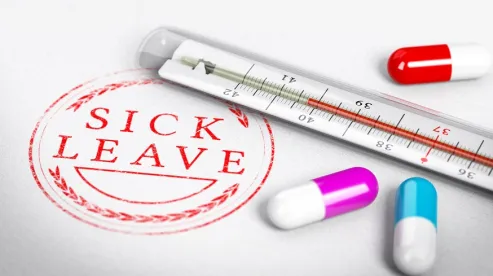New Jersey has joined Arizona, California, Connecticut, Maryland, Massachusetts, Oregon, Rhode Island, Vermont, and Washington in enacting statewide paid sick leave legislation.
The New Jersey legislation, which was signed into law by Governor Phil Murphy on May 2, 2018, will allow New Jersey employees to accrue up to 40 hours (five days) of paid sick and safe leave annually. The law becomes effective October 29, 2018—i.e., 180 days after signing.
Which Employees Are Covered?
The law covers nearly all New Jersey employees, including temporary and seasonal employees. But the law excludes employees in the construction industry that are under contract pursuant to a collective bargaining agreement, per diem hospital health care employees, and public employees who are provided with sick leave with full pay pursuant to any other law, rule, or regulation.
Does the Law Exempt Employers That Already Provide PTO?
In part. An employer that provides at least 40 hours of paid time off (“PTO”) or paid vacation time that employees are permitted to use for sick and safe leave need not provide additional sick leave to employees who have used their annual allotment for purposes other than sick or safe leave, as long as the employer’s policies make clear that such additional paid leave will not be provided.
Employers must nevertheless ensure that their PTO policies conform to the law’s coverage mandates, such as allowing an employee to take leave to care for a sick child or handle a domestic violence matter. In addition, employers must comply with the law’s accrual, carryover, and payout requirements, as well as those pertaining to notice, documentation, and non-retaliation.
How Do Employees Accrue Leave?
Accrual vs. Front-Loading. Employers may require their employees to accrue leave at a rate of one hour per 30 hours worked. Alternatively, employers may choose instead to “front-load” their employees’ sick and safe leave. Front-loading leave provides the entire amount of leave that an employee is entitled to, i.e. 40 hours annually, at the beginning of the year.
An exempt employee accrues sick and safe leave based on a 40-hour workweek, unless the employee’s normal workweek is less than 40 hours, in which case the employee will accrue sick and safe leave based on his or her normal workweek hours.
Current employees must begin accruing sick and safe leave as of their first day of work on or after October 29, 2018. Employees hired after the effective date will begin accruing upon the commencement of employment.
Employers may, however, require a waiting period of up to 120 days before allowing employees to take sick and safe leave. In addition, employers, at their discretion, may loan sick and safe leave to an employee in advance of accrual.
For What Purposes Can Employees Use Sick and Safe Leave?
Sick and safe leave may be taken for the following reasons:
-
an employee’s mental or physical illness, injury, or health condition, including the need for medical diagnosis, care, treatment, recovery, or preventative care;
-
for the same purposes when caring for a family member (a “family member” is defined as “a child, grandchild, sibling, spouse, domestic partner, civil union partner, parent, or grandparent of an employee, or a spouse, domestic partner, or civil union partner of a parent or grandparent of the employee, or a sibling of a spouse, domestic partner, or civil union partner of the employee, or any other individual related by blood to the employee or whose close association with the employee is the equivalent of a family relationship”);
-
the employee was a victim of domestic violence, sexual assault, stalking, or sexual contact, or is needed to provide certain care or assistance to a family member who was a victim of such conduct; and
-
to provide care for oneself or a family member because (1) the employee’s place of business has been closed due to a public health emergency, (2) a child’s school or place of care has been closed due to a public health emergency, or (3) the individual or a family member has a communicable disease that may jeopardize the health of others
Employees may not use paid sick and safe leave as an excuse to be late for work without an authorized purpose.
What Are the Notice and Documentation Requirements?
Employee Notice Requirements
Employees may request sick and safe leave orally, in writing, electronically, or by any other means acceptable to the employer. When possible, requests for leave should include the expected duration.
Employers may require employees to request leave of up to seven days in advance, for leave that is foreseeable. Employees should make a reasonable effort to schedule the leave in a way that does not unduly disrupt the workplace. Employers may establish a written policy establishing procedures for requesting leave, including procedures to follow when the need for leave is unforeseeable. Although the law does not prohibit unwritten notice policies, as a practical matter, it will be difficult for employers to establish that employees have been told what notice is required without a written policy.
Reasonable Documentation
Employers may require reasonable documentation to support an employee’s need for paid sick and safe leave that is more than three consecutive workdays.
One of the following, of the employee’s choosing, will be considered “reasonable documentation” of the need for sick or safe leave:
-
documentation signed by a health care professional indicating that paid sick leave is necessary; or
-
medical documentation, a police report, certification from a professional worker who assisted the employee or family member, or a court document indicating that the employee or employee’s family member is a victim of or involved in a legal action related to domestic violence, stalking, or sexual assault; or
-
a signed statement from a victim and witness advocate affirming that the employee or employee’s family member is receiving services from a victim services organization or is involved in legal action related to domestic violence, sexual assault, or stalking.
What Are the Carryover, Front-Loading, and Payout Rules?
-
Carryover. Unless an employer pays out paid sick and safe leave at the end of the benefit year (see below), unused paid sick and safe leave must be carried over to the next year.
-
Payout in Lieu of Carryover. Employers may, if they wish, give employees the option of receiving payment for either 100 percent or 50 percent of the employee’s accrued, unused sick and safe leave at the end of the benefit year. If an employee declines payment for unused earned sick leave, or agrees to a payment for 50 percent of the amount, the employee will be entitled to carry over the unused or unpaid earned sick leave to the next benefit year. Employers are not required to permit the carryover of more than 40 hours.
Employers that front-load sick and safe leave are exempt from tracking accruals and are not required to permit a carryover. They must, however, pay employees any unused sick and safe leave up to 40 hours.
-
Pay Upon Separation. Upon separation of employment, employers are not required to pay out accrued, unused sick and safe leave.
What Else Should Employers Know?
-
Notice. The New Jersey Department of Labor will create notices that employers may use to advise employees of the requirements under the law. Employers must post the notification in a conspicuous place that is accessible to all employees in each of the employer’s workplaces, upon hire and upon request by an employee. Employers must also provide employees with a written copy of the notification within 30 days of its issuance.
-
Document Retention. Employers must retain documents showing hours worked by employees for a period of five years. Exempt employees will be presumed to work 40 hours a week, or their normal workweek schedule, whichever is shorter.
-
Replacement Workers. Employers cannot require an employee to find a replacement worker to cover for the employee as a condition for using accrued sick and safe leave.
-
Comp Time. In lieu of using accrued sick and safe leave hours, employers and employees may mutually agree to allow an employee to work an equivalent number of hours during the same or next pay period for hours missed due to sick or safe leave. In such circumstances, however, the employee will still have the accrued time for future use (or for a potential carryover or payout).
-
Transfer or Rehire. If an employee transfers to a separate division, entity, or location within New Jersey but remains with the same employer, the employee keeps all paid sick and safe leave already accrued. If an employee is rehired within six months of separation by the same employer, all previously accrued paid sick and safe leave must be reinstated and become immediately available.
-
Abuse of Leave. Employers may discipline employees for committing fraud or abuse or for demonstrating a clear pattern of taking leave just before or after a weekend or holiday, unless the employee provides reasonable documentation that the paid leave was indeed for a covered purpose.
-
Successor Employers. Employees retained by a successor employer within New Jersey retain their rights to the earned paid leave that they accrued under their former employer.
-
Penalties. Employers that violate the law will be subject to a penalties set forth in the New Jersey State Wage and Hour Law, which provides for penalties of up to $1,000 or imprisonment for not less than 10 days nor more than 90 days, with each week of violation constituting a separate offense.
What New Jersey Employers Should Do Now
The requirements of the law for employers will take effect on October 29, 2018. In the meantime, employers should do the following:
-
If you do not currently provide paid leave, establish and distribute a written sick and safe leave policy that indicates whether leave is front-loaded or accrued. Make sure that the policy also includes:
-
procedures for requesting leave in advance and when leave is unforeseeable, including notification and documentation requirements;
-
notice that employees who exhaust PTO or paid vacation time will not be entitled to additional paid sick and safe leave;
-
an explanation of the carryover and payout of accrued leave; and
-
a statement that employees will not be retaliated against for utilizing paid sick leave.
-
-
Review and revise PTO policies, if any, to ensure compliance with the new law.
-
Provide training to management, payroll, and human resources staff on the requirements of the new law.
-
Post the New Jersey Department of Labor’s notice, when available, in a conspicuous place at each of your work places, and provide employees with a written copy of the notification within 30 days of its issuance.




 />i
/>i

